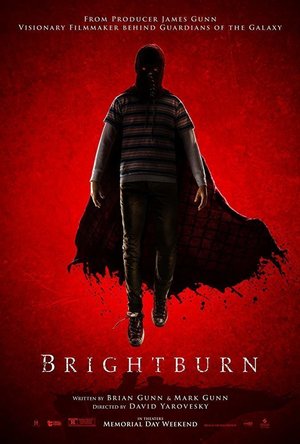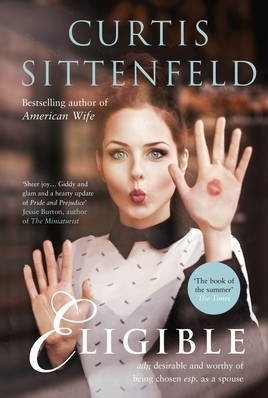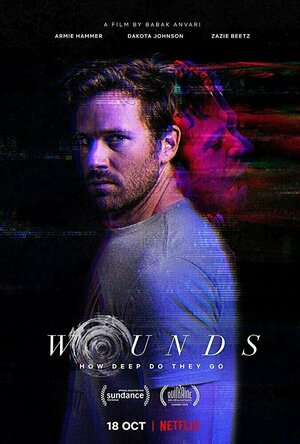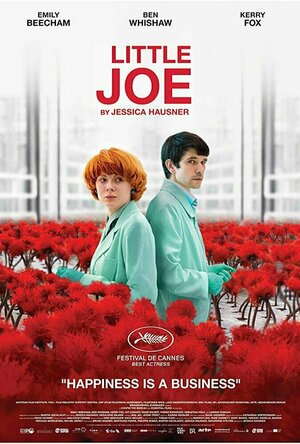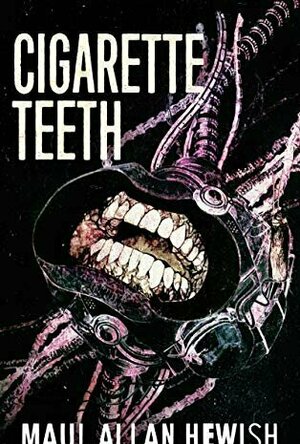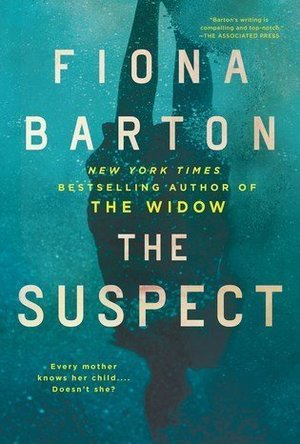Search
Search results
Lee (2222 KP) rated Brightburn (2019) in Movies
Jun 11, 2019
What if Clark Kent grew up to be evil? What if, instead of growing up to be this all powerful protector of Earth and humanity, he decided he wanted to take the world, cruelly toying with and destroying humanity in the process? That's the premise behind Brightburn, a superhero horror movie from producer James Gunn, of Guardians of the Galaxy fame. Comic books are littered with plenty of 'what if' story-lines and alternate takes on popular superheroes, but up until now probably the most famous onscreen version of an evil Superman we've seen was in Superman III. And even then we only really got a drunk, unshaven, but still family friendly Superman, who felt a bit mischievous and blew out the Olympic torch for a bit of a laugh. Brightburn goes a lot darker, leaning heavily into horror with some wonderful, wince-inducing gory moments. If you're looking for Dark Phoenix levels of dark - moody, crying in the corner, that kind of thing - then you're going to be disappointed.
Brightburn begins by mirroring the origin story of Superman very closely - even the soundtrack reminded me of the music from 2013 movie Man of Steel on more than one occasion! Tori (Elizabeth Banks) and Kyle Bryer (David Denman) are a happily married couple, living on a farm and longing for a child of their own. And then one night, a meteor crash lands out in the nearby woods, bringing them a baby boy who they adopt as their own. We see home movies of a normal baby/toddler as he grows up as part of a normal, loving family. And then we move forward 10 years to present day.
As an adolescent, Brandon (Jackson A. Dunn) begins to experience some change in his life. His parents put it down to hormones, and attempt to give him the talk on girls and the facts of life, but it's a lot more than that. The rock shaped vessel which carried Brandon to Earth as a baby has been locked away in the family barn all these years, hidden from Brandon, but has now started glowing red. At the same time, something within Brandon appears to have been activated, and a number of small but disturbing incidents that follow leave his parents worried. They also realise that they've never actually seen their son bleed, or even hurt before. From there, the severity of these incidents increases greatly, and it becomes clear that there is definitely something very, very wrong with Brandon.
What I loved about Brightburn was the confined, low key setting of it all. The action is restricted primarily to the town of Brightburn, never really expanding into the worldwide, CGI heavy destruction of other superhero movies. We have an incredibly relatable mother who is out to love and protect her son until the bitter end, a father who becomes scared and horrified by everything that is unfolding, and then this powerful boy tearing the family apart - unpredictable and showing no sign of remorse or inner turmoil over everything that is happening. Outside of that, the action is confined to a relatively small cast - the local police, extended family and some other kids from school who we all follow throughout the movie - there's a lot of character depth to be found in Brightburn, which greatly adds to its overall enjoyment.
As is the norm these days though, the trailer does give away the majority of Brandon's targets and where he attacks them, meaning you kind of know what to expect for a lot of it. However, what the trailer doesn't give away is the atmosphere and the eeriness that builds to each of those shocking (and gory) moments and there are still plenty of jump scares and shocking scenes to keep you on your toes throughout. It builds to a climax which once again isn't a CGI overload, relying on shock and horror to deliver it's interesting conclusion. And, most importantly, it leaves the door open for what could be a very interesting sequel. I'm all up for that, and the direction that hints at, as I found Brightburn to be a very enjoyable and fresh take on the superhero genre.
Brightburn begins by mirroring the origin story of Superman very closely - even the soundtrack reminded me of the music from 2013 movie Man of Steel on more than one occasion! Tori (Elizabeth Banks) and Kyle Bryer (David Denman) are a happily married couple, living on a farm and longing for a child of their own. And then one night, a meteor crash lands out in the nearby woods, bringing them a baby boy who they adopt as their own. We see home movies of a normal baby/toddler as he grows up as part of a normal, loving family. And then we move forward 10 years to present day.
As an adolescent, Brandon (Jackson A. Dunn) begins to experience some change in his life. His parents put it down to hormones, and attempt to give him the talk on girls and the facts of life, but it's a lot more than that. The rock shaped vessel which carried Brandon to Earth as a baby has been locked away in the family barn all these years, hidden from Brandon, but has now started glowing red. At the same time, something within Brandon appears to have been activated, and a number of small but disturbing incidents that follow leave his parents worried. They also realise that they've never actually seen their son bleed, or even hurt before. From there, the severity of these incidents increases greatly, and it becomes clear that there is definitely something very, very wrong with Brandon.
What I loved about Brightburn was the confined, low key setting of it all. The action is restricted primarily to the town of Brightburn, never really expanding into the worldwide, CGI heavy destruction of other superhero movies. We have an incredibly relatable mother who is out to love and protect her son until the bitter end, a father who becomes scared and horrified by everything that is unfolding, and then this powerful boy tearing the family apart - unpredictable and showing no sign of remorse or inner turmoil over everything that is happening. Outside of that, the action is confined to a relatively small cast - the local police, extended family and some other kids from school who we all follow throughout the movie - there's a lot of character depth to be found in Brightburn, which greatly adds to its overall enjoyment.
As is the norm these days though, the trailer does give away the majority of Brandon's targets and where he attacks them, meaning you kind of know what to expect for a lot of it. However, what the trailer doesn't give away is the atmosphere and the eeriness that builds to each of those shocking (and gory) moments and there are still plenty of jump scares and shocking scenes to keep you on your toes throughout. It builds to a climax which once again isn't a CGI overload, relying on shock and horror to deliver it's interesting conclusion. And, most importantly, it leaves the door open for what could be a very interesting sequel. I'm all up for that, and the direction that hints at, as I found Brightburn to be a very enjoyable and fresh take on the superhero genre.
If you thought a modern retelling of [b:Pride and Prejudice|1885|Pride and Prejudice|Jane Austen|https://d.gr-assets.com/books/1320399351s/1885.jpg|3060926]--set mainly in present day Cincinnati--didn't exactly sound like a page-turner, no one could exactly blame you. But, nonetheless, you'd be quite wrong. Sittenfeld's novel imagines the Bennet family in our modern times; Mr. and Mrs. Bennet live in a rambling Tudor home in Cincinnati: broke and somewhat clueless as their house crumbles around them. Mrs. Bennet spends her time clucking around her five unmarried daughters: Jane, Liz, Mary, Kitty, and Lydia. The book revolves mainly around the perspective of Liz, a magazine writer in her upper thirties living in New York City. She and Jane, also in NYC, return home to their parents and younger sisters after Mr. Bennet has a heart attack, only to find the house and the family in a bit of a shambles.
The book is amazing. It's been a while since I read [b:Pride and Prejudice|1885|Pride and Prejudice|Jane Austen|https://d.gr-assets.com/books/1320399351s/1885.jpg|3060926], but even I can tell you that the novel does an excellent job of following the original plot without being annoying or cloying. It's [b:Pride and Prejudice|1885|Pride and Prejudice|Jane Austen|https://d.gr-assets.com/books/1320399351s/1885.jpg|3060926] with lesbians and hate sex! The book comes across as familiar yet new, allowing you to ache, laugh, and rage at what feels like a group of old friends.
Mr. Bennet is a trip, even while having a heartbreaking sadness and sweetness at his core (though some of his zingers are priceless). The younger sisters are as (nearly) vapid as to be expected--truly awful at times--for much of the book. But seriously, Lydia and Kitty loving CrossFit? It's awesome. And Liz is wonderful; you will adore this surprisingly realistic and modern Liz, with all of her foibles and issues: a truly modern Liz struggling mightily to keep her family together and afloat.
As for Darcy, well he's as Darcy as ever. Somehow Sittenfeld has managed to truly capture the essence of Austen's Darcy and Elizabeth in her new characters. I don't know how, but it's funny and lovely all at the same time. (Side note: As a woman in her early thirties, will I ever be able to read about Darcy without picturing Colin Firth? I now have a desperate need to watch the BBC/A&E mini-series again.)
Overall, I found this book funny, touching, and compulsively readable. The characters are truly characters: they are fully formed within moments of picking up the book. The city of Cincinnati makes a great guest appearance, with the city playing a prominent role in many scenes (hi Skyline Chili!). If you loved the original, you'll find this updated version enjoyable and imaginative, with a surprising depth behind it. If you've never read Austen's work (and you should), you will still discover a funny, sweet yet weighty story of a family trying to make it in this day and age. Highly recommended (4.5 stars).
I received an ARC of this novel from Netgalley (thank you!); it is available for U.S. publication on 4/19/16. You can check out a review of this novel and many others on my <a href="http://justacatandabookatherside.blogspot.com/">blog</a>;.
The book is amazing. It's been a while since I read [b:Pride and Prejudice|1885|Pride and Prejudice|Jane Austen|https://d.gr-assets.com/books/1320399351s/1885.jpg|3060926], but even I can tell you that the novel does an excellent job of following the original plot without being annoying or cloying. It's [b:Pride and Prejudice|1885|Pride and Prejudice|Jane Austen|https://d.gr-assets.com/books/1320399351s/1885.jpg|3060926] with lesbians and hate sex! The book comes across as familiar yet new, allowing you to ache, laugh, and rage at what feels like a group of old friends.
Mr. Bennet is a trip, even while having a heartbreaking sadness and sweetness at his core (though some of his zingers are priceless). The younger sisters are as (nearly) vapid as to be expected--truly awful at times--for much of the book. But seriously, Lydia and Kitty loving CrossFit? It's awesome. And Liz is wonderful; you will adore this surprisingly realistic and modern Liz, with all of her foibles and issues: a truly modern Liz struggling mightily to keep her family together and afloat.
As for Darcy, well he's as Darcy as ever. Somehow Sittenfeld has managed to truly capture the essence of Austen's Darcy and Elizabeth in her new characters. I don't know how, but it's funny and lovely all at the same time. (Side note: As a woman in her early thirties, will I ever be able to read about Darcy without picturing Colin Firth? I now have a desperate need to watch the BBC/A&E mini-series again.)
Overall, I found this book funny, touching, and compulsively readable. The characters are truly characters: they are fully formed within moments of picking up the book. The city of Cincinnati makes a great guest appearance, with the city playing a prominent role in many scenes (hi Skyline Chili!). If you loved the original, you'll find this updated version enjoyable and imaginative, with a surprising depth behind it. If you've never read Austen's work (and you should), you will still discover a funny, sweet yet weighty story of a family trying to make it in this day and age. Highly recommended (4.5 stars).
I received an ARC of this novel from Netgalley (thank you!); it is available for U.S. publication on 4/19/16. You can check out a review of this novel and many others on my <a href="http://justacatandabookatherside.blogspot.com/">blog</a>;.

Entrepreneur News - Inspiring Startup Interviews
Business and News
App
The Entrepreneur Podcast is created for today’s entrepreneur whether you have just started your...

République
Games and Entertainment
App
In “Episode 5: Terminus," the fifth and final episode of the thrilling République saga, battle...
Emma @ The Movies (1786 KP) rated Wounds (2019) in Movies
Oct 17, 2019
Will's life isn't that complicated, he does his shifts at the bar, comes home to his girlfriend Carrie and in between he flirts with one of the regulars, Alicia.
Life in the bar is pretty predictable, everyone drinks too much and there's the occasional fight. On this particular evening things get even stranger. When Eric and his friends arrive already drunk Will leaves them be, he's more intrigued by the group of college kids who arrive looking quite out of place. Everything is turned upside down when Eric and his friends start fighting and bring the night to a quick end.
Clearing up the debris Will finds a phone belonging to one of the kids, he takes it home intending to put it in lost property the next day but before that happens he discovers some shocking images that lead him and Carrie down a terrifying rabbit hole.
Wounds has a nice idea behind it but once I came out of the film and started thinking about it I began realising that somehow it's all just a little vague. One of the things I like about films with sci-fi and supernatural leanings is finding out about where the "things" have come from, in Wounds they give you a hint about it but nothing solid to go on. Will and Carrie are only given the vaguest of clues about what is happening and it's surprisingly frustrating. It felt very much like we'd been handed film two in a series and somewhere along the line we'd be handed the first film as a prequel and watch it end as they drop the phone in the bar.
We're also probably subjected to a little too much drama. The beginning takes a while to get to the horror aspect of things. By the time it came out I was genuinely surprised. I'd assumed the horror tag was added at a stretch as it was coming across as a thriller more than everything else. Certainly the drama portion seemed to be unnecessary to most of what was going on by the end of the film.
Armie Hammer plays Will in the main role of the movie. Will's journey goes through a lot of stages, potentially too many. It does at least work in a sensible progression rather than jumping around. Hammer is convincing in all stages even if they do seem a little far fetched but I would personally have axed some of it.
Here's what I would have done... Zazie Beetz was great and I love her in everything I've seen, in my opinion she was underused in this film. I'd have given her the role of Carrie and expanded it slightly while cutting Alicia and her boyfriend out completely. Beetz's performance was great but there wasn't really anything to get her teeth into when it came to the horror side of everything. She had great chemistry with Hammer onscreen which I didn't get from his performances with Johnson. Johnson's performance in general felt underwhelming, Carrie wasn't going to be a likeable character but she could have been so much more.
Sound plays a very big part in the film. As I mentioned at the beginning creepy crawlies play a big part in Wounds, and even when they're not there you know they're there. It's incredibly well done because more than once I found myself getting twitchy that I could hear them in the background of scenes. The other noticeable sound related issue was around the phone, at one point Will answers the mobile and we're subjected to a loud piercing tone that cuts right through you. Again, fantastic use of sound, but in this instance while it makes you feel the unease of Will as it happens it is also painfully loud for anyone who is even slightly sensitive to things like that.
The film uses effects to create the swarms of bugs... although saying that, if they didn't then it's a very impressive bunch of cockroach wranglers they have on staff. The effects themselves aren't fantastic but when they happen it's so fast that it kind of works in the moment.
It might not be the best horror film but it certainly wasn't a bad watch. It comes out on Netflix tomorrow, I won't be seeing it again right away but it's definitely going onto the Watchlist for the future.
Originally posted on: http://emmaatthemovies.blogspot.com/2019/10/wounds-movie-review.html
Life in the bar is pretty predictable, everyone drinks too much and there's the occasional fight. On this particular evening things get even stranger. When Eric and his friends arrive already drunk Will leaves them be, he's more intrigued by the group of college kids who arrive looking quite out of place. Everything is turned upside down when Eric and his friends start fighting and bring the night to a quick end.
Clearing up the debris Will finds a phone belonging to one of the kids, he takes it home intending to put it in lost property the next day but before that happens he discovers some shocking images that lead him and Carrie down a terrifying rabbit hole.
Wounds has a nice idea behind it but once I came out of the film and started thinking about it I began realising that somehow it's all just a little vague. One of the things I like about films with sci-fi and supernatural leanings is finding out about where the "things" have come from, in Wounds they give you a hint about it but nothing solid to go on. Will and Carrie are only given the vaguest of clues about what is happening and it's surprisingly frustrating. It felt very much like we'd been handed film two in a series and somewhere along the line we'd be handed the first film as a prequel and watch it end as they drop the phone in the bar.
We're also probably subjected to a little too much drama. The beginning takes a while to get to the horror aspect of things. By the time it came out I was genuinely surprised. I'd assumed the horror tag was added at a stretch as it was coming across as a thriller more than everything else. Certainly the drama portion seemed to be unnecessary to most of what was going on by the end of the film.
Armie Hammer plays Will in the main role of the movie. Will's journey goes through a lot of stages, potentially too many. It does at least work in a sensible progression rather than jumping around. Hammer is convincing in all stages even if they do seem a little far fetched but I would personally have axed some of it.
Here's what I would have done... Zazie Beetz was great and I love her in everything I've seen, in my opinion she was underused in this film. I'd have given her the role of Carrie and expanded it slightly while cutting Alicia and her boyfriend out completely. Beetz's performance was great but there wasn't really anything to get her teeth into when it came to the horror side of everything. She had great chemistry with Hammer onscreen which I didn't get from his performances with Johnson. Johnson's performance in general felt underwhelming, Carrie wasn't going to be a likeable character but she could have been so much more.
Sound plays a very big part in the film. As I mentioned at the beginning creepy crawlies play a big part in Wounds, and even when they're not there you know they're there. It's incredibly well done because more than once I found myself getting twitchy that I could hear them in the background of scenes. The other noticeable sound related issue was around the phone, at one point Will answers the mobile and we're subjected to a loud piercing tone that cuts right through you. Again, fantastic use of sound, but in this instance while it makes you feel the unease of Will as it happens it is also painfully loud for anyone who is even slightly sensitive to things like that.
The film uses effects to create the swarms of bugs... although saying that, if they didn't then it's a very impressive bunch of cockroach wranglers they have on staff. The effects themselves aren't fantastic but when they happen it's so fast that it kind of works in the moment.
It might not be the best horror film but it certainly wasn't a bad watch. It comes out on Netflix tomorrow, I won't be seeing it again right away but it's definitely going onto the Watchlist for the future.
Originally posted on: http://emmaatthemovies.blogspot.com/2019/10/wounds-movie-review.html
Emma @ The Movies (1786 KP) rated Little Joe (2019) in Movies
Feb 6, 2020
I managed to get a ticket to see this at the London Film Festival, it had made my long shortlist, the premise looked interesting and the graphics were extremely appealing. I was very excited to see what Little Joe had in store.
Alice is developing a new breed of flower, a beautiful crimson flower that has an incredible therapeutic value to its owner. Look after it properly, speak to it nicely, and it will make you happy.
After Alice sneaks one home to her son she soon notices that rather than a happy demeanour he starts acting strangely, and he's not the only one showing odd behaviour after being around Little Joe.
Little Joe has some very strong style choices. The colour palette is beautiful, and I wish I could find the notes I made about it from the Q&A after the film. The vibrant pastels are homely and comforting while at the same time unsettling around the normal tones of life.
That's what a lot of the film is made to do though, the music is something I noted frequently. The oriental music works directly against what's happening in the story, an intentional choice by the composer. I also wrote down the word "whistling" a lot with regards to sound. While I can understand (sort of) why the composer went that way with the music I didn't feel like it worked. I didn't dislike the music itself, but my comments were mainly exclaiming that it stuck out and felt too different from everything around it that it became distracting.
Another piece of the film that didn't sit well with me was camera work. There are some very well shot scenes, when we first encounter Little Joe in Alice's home and a scene later on inside the greenhouse (that I won't go into because of spoilers), that draw the viewer in with intrigue. But then... you know when you're doing something and you get bored and realise you've drifted off looking at a point in the distance? The camera appears to get bored too and it'll zoom to the gaps between characters. Maybe I'm just programmed to expect this sort of shot to reveal something secret to the audience that the characters haven't noticed... I found it more distracting and annoying than having any artistic benefit.
Alice (Emily Beecham) has a dual mother role, firstly with her son Joe and secondly with her plants. Little Joe appears to be more like a son to her than her own flesh and blood, her scientific mind perhaps finding it easier to interact with an inanimate object that begins to defy what she knows to be possible. The film gets across her struggle quite well with her therapy sessions and the interactions with those around her as we get deeper into the story. Beecham's performance is... relaxed? Even when there's urgency nothing ever seems to be very urgent.
That's something that is common throughout, the pace plods. You would expect a somewhat subdued pace in this sort of invasion storyline, but there are no real points of climax and that makes it more of a meander... perhaps those exciting moments happened when the camera zoned out.
There are touches here and there that do make you hopeful for the film, but overall it feels like Little Joe went for subtle and took it slightly too far. Everything felt too calm, the only one that seemed to react as you'd expect was Bella, but the nature of her part of the story meant that this was over the top because it was so far from everything else.
I like the idea behind this and we know from many different films that this sort of thing can work, but the lack of a real punch anywhere made this a struggle to watch. Oddly, I think this would have worked as a limited series without a lot of changes. The slow pace wouldn't have been so evident if it was broken down into episodes, there are small peaks in there that would give just enough intrigue to hold over to the next episode, I even feel like the ending as it is would have worked more in this style. Sadly, as it was I don't feel like there was enough reward for the time invested in watching it as a film, there's a different expectation between and film and a TV series but it's very difficult to explain it here without revealing spoilers.
Originally posted on: https://emmaatthemovies.blogspot.com/2020/02/little-joe-movie-review.html
Alice is developing a new breed of flower, a beautiful crimson flower that has an incredible therapeutic value to its owner. Look after it properly, speak to it nicely, and it will make you happy.
After Alice sneaks one home to her son she soon notices that rather than a happy demeanour he starts acting strangely, and he's not the only one showing odd behaviour after being around Little Joe.
Little Joe has some very strong style choices. The colour palette is beautiful, and I wish I could find the notes I made about it from the Q&A after the film. The vibrant pastels are homely and comforting while at the same time unsettling around the normal tones of life.
That's what a lot of the film is made to do though, the music is something I noted frequently. The oriental music works directly against what's happening in the story, an intentional choice by the composer. I also wrote down the word "whistling" a lot with regards to sound. While I can understand (sort of) why the composer went that way with the music I didn't feel like it worked. I didn't dislike the music itself, but my comments were mainly exclaiming that it stuck out and felt too different from everything around it that it became distracting.
Another piece of the film that didn't sit well with me was camera work. There are some very well shot scenes, when we first encounter Little Joe in Alice's home and a scene later on inside the greenhouse (that I won't go into because of spoilers), that draw the viewer in with intrigue. But then... you know when you're doing something and you get bored and realise you've drifted off looking at a point in the distance? The camera appears to get bored too and it'll zoom to the gaps between characters. Maybe I'm just programmed to expect this sort of shot to reveal something secret to the audience that the characters haven't noticed... I found it more distracting and annoying than having any artistic benefit.
Alice (Emily Beecham) has a dual mother role, firstly with her son Joe and secondly with her plants. Little Joe appears to be more like a son to her than her own flesh and blood, her scientific mind perhaps finding it easier to interact with an inanimate object that begins to defy what she knows to be possible. The film gets across her struggle quite well with her therapy sessions and the interactions with those around her as we get deeper into the story. Beecham's performance is... relaxed? Even when there's urgency nothing ever seems to be very urgent.
That's something that is common throughout, the pace plods. You would expect a somewhat subdued pace in this sort of invasion storyline, but there are no real points of climax and that makes it more of a meander... perhaps those exciting moments happened when the camera zoned out.
There are touches here and there that do make you hopeful for the film, but overall it feels like Little Joe went for subtle and took it slightly too far. Everything felt too calm, the only one that seemed to react as you'd expect was Bella, but the nature of her part of the story meant that this was over the top because it was so far from everything else.
I like the idea behind this and we know from many different films that this sort of thing can work, but the lack of a real punch anywhere made this a struggle to watch. Oddly, I think this would have worked as a limited series without a lot of changes. The slow pace wouldn't have been so evident if it was broken down into episodes, there are small peaks in there that would give just enough intrigue to hold over to the next episode, I even feel like the ending as it is would have worked more in this style. Sadly, as it was I don't feel like there was enough reward for the time invested in watching it as a film, there's a different expectation between and film and a TV series but it's very difficult to explain it here without revealing spoilers.
Originally posted on: https://emmaatthemovies.blogspot.com/2020/02/little-joe-movie-review.html
Bob Mann (459 KP) rated Dune (2021) in Movies
Oct 28, 2021
“He’s Not The Messiah – He’s a Very Naughty Boy!”
Certain works of fiction have been labelled with the tag of “unfilmable”, and Frank Herbert’s 1965 novel “Dune” is one of those. It’s full of exposition done as internal monologues – which screams “movie voiceover”. And regular readers will know my hatred of those!
Amazingly, Denis Villeneuve manages to pull off the impossible with his version of Dune (part 1), which I saw last night as part of a Cineworld Unlimited preview event. It’s close to being a movie masterpiece.
Plot Summary:
The desert planet of Arrakis is home to the Freman tribe but is a political battleground since it is the only known source of ‘Spice’: a substance that enables interplanetary travel.
Paul (Timothée Chalamet) is the heir to the throne of the House of Atreides, headed by his father Duke Leto Atreides (Oscar Isaac). His mother (Rebecca Ferguson) is Leto’s concubine and possessed with hereditary gifts: mystical powers that make her part of a sect of galactic ‘witches’ with mystical powers. But the House of Atreides is gaining in power, and the Emperor throws a political spanner into the works by evicting the vicious House of Harkonnen from Arrakis and giving it to Atreides. This puts both Houses on the path of war.
Certification:
US: PG-13. UK: 12A.
Talent:
Starring: Timothée Chalamet, Rebecca Ferguson, Oscar Isaac, Zendaya, Jason Momoa, Stellan Skarsgård, Josh Brolin, Javier Bardem, Dave Bautista, Charlotte Rampling.
Directed by: Denis Villeneuve.
Written by: Jon Spaihts, Denis Villeneuve and Eric Roth. (Based on the novel by Frank Herbert).
“Dune” Review: Positives:
My 5*’s for this one goes for the overall vision, which is grandiose with scenes that stick in the brain. As he demonstrated in “Arrival“, Villeneuve likes to go for huge spacecraft that hang “in the sky in much the same way that bricks don’t”*. And the ships in this vision are just HUGE.
The ensemble cast does a great job, with Chalamet, Isaac and Ferguson being particularly impressive. Stellan Skarsgård (looking like he is about to tell “a very amusing story about a goat”, if you get that movie reference!) looks to have the most gruelling acting job, having to emerge from, and descend into, a bath of black goo!
Much like Villeneuve’s “Blade Runner 2049“, this movie has cinematography that is worthy of framing and sticking on your wall. (Greig Fraser is the man behind the camera here).
Hans Zimmer‘s music is phenomenal. I’m not sure it’s a good ‘sit down and listen to’ sort of soundtrack, but it fits the movie beautifully.
* I used this Douglas Adams quote for my “Arrival” review, and then Mark Kermode used the same quote: I like to think he read my review!
Negatives:
It wasn’t a problem for me, but I expect some will consider the movie to be too much mood and not enough action. I’ve seen some comment that the film was “emotionally empty”: but I really didn’t feel that, and am well-invested in the story ready for “Part 2”.
This is probably faithful to the books, but given all of the advanced spacecraft technology on show, and laser/blaster technology, it seems bonkers that when we get to hand-to-hand combat between the armies that we get into “swords and sandals” territory.
Observation:
There’s nothing new under the Tatooine suns. And so much of this film has you linking the concepts back to “Star Wars”:
“The Force” is now “The Way”
The Jedi are the ‘Ben and Jerry Set’. (Well, that’s what it sounded like to me… and I don’t even like Ice Cream!)
Both films centre on a Messiah-like “chosen one”, foretold by legend
“Spice” also features in “Star Wars” with “spice runners” (as in the Millenium Falcon doing the ‘Kessel Run’)
There’s even a ‘pit of sarlaac’ moment in “Dune”.
Of course, since Frank Herbert wrote “Dune” in 1965, there’s a significant question as to who is plagiarising who here!
Summary Thoughts on “Dune”
At 2 hours 35 minutes, it’s YET ANOTHER long movie: cementing October 2021 as the month of long movies. (I just did a quick tally, and of the six films I’ve seen this month they average 139 minutes in length: and that’s with “Venom: Let There Be Carnage” dragging the average down!)
But this is a movie that MUST be seen on the big screen. It’s a memorable movie experience and highly recommended.
I can’t wait for Villeneuve’s “Part 2”, currently in pre-production.
Amazingly, Denis Villeneuve manages to pull off the impossible with his version of Dune (part 1), which I saw last night as part of a Cineworld Unlimited preview event. It’s close to being a movie masterpiece.
Plot Summary:
The desert planet of Arrakis is home to the Freman tribe but is a political battleground since it is the only known source of ‘Spice’: a substance that enables interplanetary travel.
Paul (Timothée Chalamet) is the heir to the throne of the House of Atreides, headed by his father Duke Leto Atreides (Oscar Isaac). His mother (Rebecca Ferguson) is Leto’s concubine and possessed with hereditary gifts: mystical powers that make her part of a sect of galactic ‘witches’ with mystical powers. But the House of Atreides is gaining in power, and the Emperor throws a political spanner into the works by evicting the vicious House of Harkonnen from Arrakis and giving it to Atreides. This puts both Houses on the path of war.
Certification:
US: PG-13. UK: 12A.
Talent:
Starring: Timothée Chalamet, Rebecca Ferguson, Oscar Isaac, Zendaya, Jason Momoa, Stellan Skarsgård, Josh Brolin, Javier Bardem, Dave Bautista, Charlotte Rampling.
Directed by: Denis Villeneuve.
Written by: Jon Spaihts, Denis Villeneuve and Eric Roth. (Based on the novel by Frank Herbert).
“Dune” Review: Positives:
My 5*’s for this one goes for the overall vision, which is grandiose with scenes that stick in the brain. As he demonstrated in “Arrival“, Villeneuve likes to go for huge spacecraft that hang “in the sky in much the same way that bricks don’t”*. And the ships in this vision are just HUGE.
The ensemble cast does a great job, with Chalamet, Isaac and Ferguson being particularly impressive. Stellan Skarsgård (looking like he is about to tell “a very amusing story about a goat”, if you get that movie reference!) looks to have the most gruelling acting job, having to emerge from, and descend into, a bath of black goo!
Much like Villeneuve’s “Blade Runner 2049“, this movie has cinematography that is worthy of framing and sticking on your wall. (Greig Fraser is the man behind the camera here).
Hans Zimmer‘s music is phenomenal. I’m not sure it’s a good ‘sit down and listen to’ sort of soundtrack, but it fits the movie beautifully.
* I used this Douglas Adams quote for my “Arrival” review, and then Mark Kermode used the same quote: I like to think he read my review!
Negatives:
It wasn’t a problem for me, but I expect some will consider the movie to be too much mood and not enough action. I’ve seen some comment that the film was “emotionally empty”: but I really didn’t feel that, and am well-invested in the story ready for “Part 2”.
This is probably faithful to the books, but given all of the advanced spacecraft technology on show, and laser/blaster technology, it seems bonkers that when we get to hand-to-hand combat between the armies that we get into “swords and sandals” territory.
Observation:
There’s nothing new under the Tatooine suns. And so much of this film has you linking the concepts back to “Star Wars”:
“The Force” is now “The Way”
The Jedi are the ‘Ben and Jerry Set’. (Well, that’s what it sounded like to me… and I don’t even like Ice Cream!)
Both films centre on a Messiah-like “chosen one”, foretold by legend
“Spice” also features in “Star Wars” with “spice runners” (as in the Millenium Falcon doing the ‘Kessel Run’)
There’s even a ‘pit of sarlaac’ moment in “Dune”.
Of course, since Frank Herbert wrote “Dune” in 1965, there’s a significant question as to who is plagiarising who here!
Summary Thoughts on “Dune”
At 2 hours 35 minutes, it’s YET ANOTHER long movie: cementing October 2021 as the month of long movies. (I just did a quick tally, and of the six films I’ve seen this month they average 139 minutes in length: and that’s with “Venom: Let There Be Carnage” dragging the average down!)
But this is a movie that MUST be seen on the big screen. It’s a memorable movie experience and highly recommended.
I can’t wait for Villeneuve’s “Part 2”, currently in pre-production.
Hadley (567 KP) rated Cigarette Teeth in Books
Dec 4, 2020
Great writing (1 more)
Amazing descriptions
In this day-and-age, everyone is willing to do anything to get what they want. People leave their morals and values behind at the drop of a hat. Partly, because of this, mental illness is at an all-time high and happiness is at an all-time low.
What if I told you there was a phone number you could call that would give you whatever you wanted...for a simple favor in return? Enter : Cigarette Teeth. The horror novel concerns two different places that exist in our world: the Pleasure Palace, where the Magician resides in an overcast of red light where he helps make peoples' 'dreams' come true, and our reality - - - the world as we've grown to know it.
Our main character, Mike Hadley, can't remember his past or how he ended up working for the Magician, but he's more than happy to do what he's told in Cigarette Teeth. Some things seem familiar to him, like his working partner, Tommy; but if you asked him what he did last night for the Magician, he wouldn't be able to tell you or remember it himself. Harper, a man Hadley meets early on in the story, who is the stereo-typical hardened detective, tells Hadley that he knows that the Pleasure Palace has been the cause of hundreds of disappearances - - - including Harper's own brother and sister- - - and demands that Hadley help him get into the Palace to find them.
Hadley is kidnapped by Harper while people working for the Pleasure Palace begin to come after them, trying to kill them. Unlike Hadley, Harper has done a lot of detective work on the Pleasure Palace and knows much more than he does. For Hadley, a lot of things begin to make sense and no sense at the same time, like people who work for the Pleasure Palace can't die, instead they regenerate in a very gruesome way- - - something he had never seen happen before. Now, being away from the Palace, whenever Hadley falls asleep, memories start to come back to him in the form of dreams; most of them take place in metaphorical places that slowly unwrap his tragic past to the reader.
I often found myself fascinated by the characters Hewish came up with that live in the Pleasure Palace. One being the Zipper Sisters: "Kela and and Lua Von Zipper. Conjoined twins; connected at the hip and zipped into the one gigantic pinched- leather corset. Two heads, two arms, and four legs, all sealed in an ornate, Victorian-style leather dress hemmed with black lace.
Their makeup was corpse-white, their lipstick blood red. Their eyes were shadowed with a weeping pastel green, like something from a carnival sideshow. Their 18th-century dress continued with ruffles and lacy stockings, all the colour of snow. The two pairs of shoes they wore- - - shiny little school shoes, the ones with the clasps over the top- - - completed the look. It gave these sinister twins a suggested air of innocence- - - the filthiest of lies. "
When the pair meet with the Architect of the Pleasure Palace (Horitoshi Li), the story really begins to take off. The information given to them by Li about the Magician is the real start to their journey to stop the Palace and find Harper's missing siblings, as long as they include Li in the plan.
As expected, a friend of Harper's, named Sophie, gets caught up in their journey- - - saving their lives more than once, thanks to her nursing background. Sophie felt like a filler character at first, but in the end, I think she was needed to make the story well-rounded, like her insight of psychology: "...But...it's just interesting. Did you know the second most common dream people have is about their teeth? After the 'being chased' phenomenon that usually coincides with a hallway and a door. Most notable psychologists don't really offer insight on dreams- - - the most popular consensus is that they're nothing more than cerebral static, just garbled images and words that occasionally form to make something that seems to have weight..."
Though I want to say so much more about the novel, it would give away a lot of the surprises that are hidden inside. Hewish's writing is gold; the way he describes scenes is beautifully done, but he did waste some of this talent on places where the characters weren't even there for more than a scene (and nothing really came of it). Also, Harper states one time early in the book that he has killed Hadley before... this is never explained or spoken of again. I think that was a very important part to this story, especially with how things turn out between Harper and Hadley.
There were only a few inconsistencies that are completely able to be looked over and don't ruin the novel. This is master storytelling, and I am looking very forward to more work by Hewish! I would recommend this book to fans of the show "Twin Peaks," and the video game (because I love horror video games) "Evil Within." Highly recommend!
What if I told you there was a phone number you could call that would give you whatever you wanted...for a simple favor in return? Enter : Cigarette Teeth. The horror novel concerns two different places that exist in our world: the Pleasure Palace, where the Magician resides in an overcast of red light where he helps make peoples' 'dreams' come true, and our reality - - - the world as we've grown to know it.
Our main character, Mike Hadley, can't remember his past or how he ended up working for the Magician, but he's more than happy to do what he's told in Cigarette Teeth. Some things seem familiar to him, like his working partner, Tommy; but if you asked him what he did last night for the Magician, he wouldn't be able to tell you or remember it himself. Harper, a man Hadley meets early on in the story, who is the stereo-typical hardened detective, tells Hadley that he knows that the Pleasure Palace has been the cause of hundreds of disappearances - - - including Harper's own brother and sister- - - and demands that Hadley help him get into the Palace to find them.
Hadley is kidnapped by Harper while people working for the Pleasure Palace begin to come after them, trying to kill them. Unlike Hadley, Harper has done a lot of detective work on the Pleasure Palace and knows much more than he does. For Hadley, a lot of things begin to make sense and no sense at the same time, like people who work for the Pleasure Palace can't die, instead they regenerate in a very gruesome way- - - something he had never seen happen before. Now, being away from the Palace, whenever Hadley falls asleep, memories start to come back to him in the form of dreams; most of them take place in metaphorical places that slowly unwrap his tragic past to the reader.
I often found myself fascinated by the characters Hewish came up with that live in the Pleasure Palace. One being the Zipper Sisters: "Kela and and Lua Von Zipper. Conjoined twins; connected at the hip and zipped into the one gigantic pinched- leather corset. Two heads, two arms, and four legs, all sealed in an ornate, Victorian-style leather dress hemmed with black lace.
Their makeup was corpse-white, their lipstick blood red. Their eyes were shadowed with a weeping pastel green, like something from a carnival sideshow. Their 18th-century dress continued with ruffles and lacy stockings, all the colour of snow. The two pairs of shoes they wore- - - shiny little school shoes, the ones with the clasps over the top- - - completed the look. It gave these sinister twins a suggested air of innocence- - - the filthiest of lies. "
When the pair meet with the Architect of the Pleasure Palace (Horitoshi Li), the story really begins to take off. The information given to them by Li about the Magician is the real start to their journey to stop the Palace and find Harper's missing siblings, as long as they include Li in the plan.
As expected, a friend of Harper's, named Sophie, gets caught up in their journey- - - saving their lives more than once, thanks to her nursing background. Sophie felt like a filler character at first, but in the end, I think she was needed to make the story well-rounded, like her insight of psychology: "...But...it's just interesting. Did you know the second most common dream people have is about their teeth? After the 'being chased' phenomenon that usually coincides with a hallway and a door. Most notable psychologists don't really offer insight on dreams- - - the most popular consensus is that they're nothing more than cerebral static, just garbled images and words that occasionally form to make something that seems to have weight..."
Though I want to say so much more about the novel, it would give away a lot of the surprises that are hidden inside. Hewish's writing is gold; the way he describes scenes is beautifully done, but he did waste some of this talent on places where the characters weren't even there for more than a scene (and nothing really came of it). Also, Harper states one time early in the book that he has killed Hadley before... this is never explained or spoken of again. I think that was a very important part to this story, especially with how things turn out between Harper and Hadley.
There were only a few inconsistencies that are completely able to be looked over and don't ruin the novel. This is master storytelling, and I am looking very forward to more work by Hewish! I would recommend this book to fans of the show "Twin Peaks," and the video game (because I love horror video games) "Evil Within." Highly recommend!
Kristy H (1252 KP) rated The Suspect (Kate Waters #3) in Books
Apr 4, 2019 (Updated Apr 8, 2019)
Intruiging, winning tale
Eighteen-year-old Alexandra O'Connor and Rosie Shaw are backpacking in Thailand for three months. But when they don't contact their families as scheduled, panic ensues. They are reported missing, and journalist Kate Waters begins covering the case as well. But this one feels especially close to her heart, as she can't help but think of her own son, Jake, who has been overseas traveling for two years. As it quickly becomes clear that there's more to Rosie and Alex's case than meets the eye, Kate will soon be drawn to into their world.
For some reason, I must have forgotten that this was another Kate Waters book, so I was really excited when I started reading and realized that both she and DI Bob Sparkes were back in this one. I really liked Barton's previous two books featuring Kate and Bob, THE WIDOW and The Child, and this one was no exception. By this point, they are starting to feel like old friends.
The story is told via short chapters from various points of view: Kate, Bob, and Alex's mother, Lesley. We also get flashbacks to Alex in Bangkok. It's all very effective, as the result is very easy-to read. The story moves along steadily, and it kept me very interested and wondering what had happened to the girls. I also found the story a little frightening and, as many thrillers do, it made me quite frightened for my children to grow up and leave the house!
Kate was her usual self--I just always find myself drawn to her. She's determined and tough, yet vulnerable. I don't know much about the press, especially not in the U.S., but Barton's take on Kate always seems really authentic to me. This makes sense, considering Barton is a former U.K. journalist: it shows. I always enjoy how focused Kate is: ready to do nearly anything to get her story. What's great about this novel is that Barton throws in a compelling personal aspect for both Kate and Bob; for Kate, it really shakes up her take on reporting, which is truly her one constant in life. While it's not easy for her (or for me, really, since I have grown to care for her), I found it interesting to watch her grapple with this. Kate also has to look at the truth and how she might present it when it's more personal for her. It's a stark dilemma, and made the book more fascinating.
"Being a reporter is touchy-feely...We're not here to observe the news happening through a telescope--or Google. You've got to plunge yourself into this job so you can feel things, see things up close, understand them. You've got to get your hands dirty. Right up to the elbows."
At the core, though, there's a very intriguing plot here: what happened to Alex and Rosie? I found the book to be really interesting, and I was sucked up along with Kate and Bob, trying to piece together the various clues as to what had happened. There are several great twists and turns thrown in: a few I guessed at, several that really surprised me. The book does a great job at exploring how the media can put a person on trial, as well as the way we portray ourselves on social media versus what's really happening behind the scenes. All the various shades of truth being presented in different facets--all quite interesting.
Overall, this one was a winner for me. It featured some characters that are old favorites, a compelling mystery, and some intriguing personal elements for said characters. I certainly hope Bob and Kate make a return appearance in another Barton book.
I received a copy of this novel from the publisher and Netgalley in return for an unbiased review.
For some reason, I must have forgotten that this was another Kate Waters book, so I was really excited when I started reading and realized that both she and DI Bob Sparkes were back in this one. I really liked Barton's previous two books featuring Kate and Bob, THE WIDOW and The Child, and this one was no exception. By this point, they are starting to feel like old friends.
The story is told via short chapters from various points of view: Kate, Bob, and Alex's mother, Lesley. We also get flashbacks to Alex in Bangkok. It's all very effective, as the result is very easy-to read. The story moves along steadily, and it kept me very interested and wondering what had happened to the girls. I also found the story a little frightening and, as many thrillers do, it made me quite frightened for my children to grow up and leave the house!
Kate was her usual self--I just always find myself drawn to her. She's determined and tough, yet vulnerable. I don't know much about the press, especially not in the U.S., but Barton's take on Kate always seems really authentic to me. This makes sense, considering Barton is a former U.K. journalist: it shows. I always enjoy how focused Kate is: ready to do nearly anything to get her story. What's great about this novel is that Barton throws in a compelling personal aspect for both Kate and Bob; for Kate, it really shakes up her take on reporting, which is truly her one constant in life. While it's not easy for her (or for me, really, since I have grown to care for her), I found it interesting to watch her grapple with this. Kate also has to look at the truth and how she might present it when it's more personal for her. It's a stark dilemma, and made the book more fascinating.
"Being a reporter is touchy-feely...We're not here to observe the news happening through a telescope--or Google. You've got to plunge yourself into this job so you can feel things, see things up close, understand them. You've got to get your hands dirty. Right up to the elbows."
At the core, though, there's a very intriguing plot here: what happened to Alex and Rosie? I found the book to be really interesting, and I was sucked up along with Kate and Bob, trying to piece together the various clues as to what had happened. There are several great twists and turns thrown in: a few I guessed at, several that really surprised me. The book does a great job at exploring how the media can put a person on trial, as well as the way we portray ourselves on social media versus what's really happening behind the scenes. All the various shades of truth being presented in different facets--all quite interesting.
Overall, this one was a winner for me. It featured some characters that are old favorites, a compelling mystery, and some intriguing personal elements for said characters. I certainly hope Bob and Kate make a return appearance in another Barton book.
I received a copy of this novel from the publisher and Netgalley in return for an unbiased review.

WebProtectMe Safe Browser with Parental Control
Productivity and Utilities
App
WebProtectMe Safe Browser(tm) is the best parental controls and security browser, providing your...
